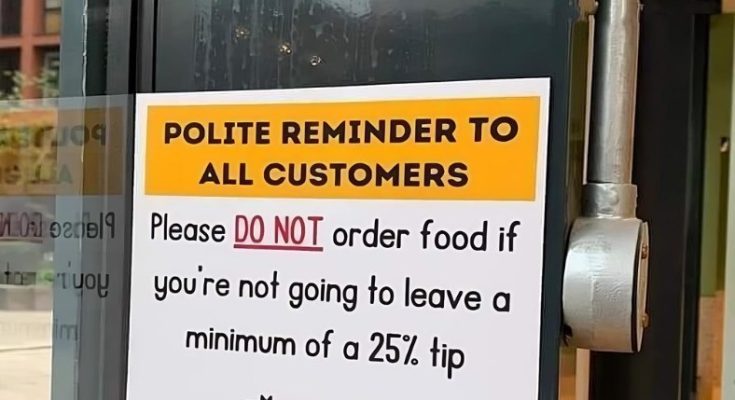Tipping has been a common practice in places like the United States and some European countries for a long time. It used to be a way to show thanks for great service, but now it’s a hot topic. What was once just a nice gesture has turned into something people feel they have to do. Many are wondering if tipping is still about being grateful or if it’s an old habit that should be looked at again.

The Original Purpose of Tipping
Tipping started as a way to say thank you for great service. This idea came from European traditions and made its way to the United States in the 1800s. People would give a little extra money to service workers who did an amazing job, which helped both sides. Customers felt good about rewarding good service, and workers appreciated the chance to make some extra cash.
But now, tipping has changed a lot. Nowadays, many people think of it as something they have to do instead of something nice. In fact, some jobs depend on tips to make up for low pay instead of getting fair wages. This change has led to a lot of arguments about whether tipping is still a fair thing to do.
Dustin Anderson: A Voice Against Tipping Culture
Dustin Anderson, who has been very vocal against tipping culture, recently gained a lot of attention for sharing his thoughts. He believes that tipping should only happen for “exceptional service,” which he thinks is becoming harder to find.
He asked his followers, “When was the last time you experienced exceptional service anywhere?” Anderson pointed out that tipping has shifted from being a way to reward great service to something people just expect, no matter how good the service is. He mentioned, “They hand you the bill and just assume you’ll add 20 or 25 percent,” showing how this expectation seems far from the original purpose of tipping.
Many people agreed with Anderson’s views. One commenter shouted, “Tipping is OUT OF CONTROL!” while another said, “Why are we tipping for coffee or takeout? It’s ridiculous.”
The Flip Side: Support for Tipping Culture
Many people agreed with Anderson’s criticism, but others stood up for tipping, especially those who have worked in restaurants. For these workers, tipping is more than just a way to say thank you; it’s essential for making a living.
“One former server mentioned that we had to PAY to serve customers who didn’t tip,” highlighting how servers often have to give a part of their earnings to the restaurant. Others pointed out how tough service jobs can be, saying that tips help make up for the hard work they do.
“Try being a waiter and see if you still think that way,” one person said in response. Many people believe the real problem is that employers depend on tips instead of giving fair wages.
Why Tipping Culture Feels Out of Hand
The way we tip today has changed a lot from how it used to be. Now, when we buy things, we often get asked to tip more than once. This happens at places like coffee shops, fast-food places, and even at self-checkout machines. It feels like there’s no way to avoid it.
Delivery services have made this situation even more complicated. There are many stories about delivery drivers canceling orders or messing up food because they didn’t get tipped. This makes customers feel stressed and unhappy about tipping.
In one popular video, a woman talked about why she chose not to tip her hairdresser who works from home. She said, “She doesn’t travel to work, and she doesn’t have extra costs. How many people earn $40 an hour?” Some people agreed with her, but others thought that tipping is still important for people in service jobs.
The Dark History of Tipping
The history of tipping in the U.S. is quite concerning. According to CBS, tipping became common after slavery ended, as restaurant owners looked for ways to avoid paying fair wages to newly freed Black workers. By depending on tips, employers could get away with paying very little or nothing at all. This situation hit women of color the hardest, creating a system of inequality that is still part of tipping culture today.
Even though the racial aspects of tipping have changed over time, the main problem still exists: workers in jobs that rely on tips often make less than minimum wage and depend on tips to survive. Many people believe this system is unfair because it puts the responsibility on customers to help pay workers instead of making employers pay a fair wage.
Tipping in Europe vs. the United States
Tipping started in Europe a long time ago, but now it’s not as common there. In many European countries, the bill already includes a service charge, and workers get good pay from their jobs. This way, there’s no confusion, and employees earn a fair wage without relying on how generous customers are.
On the other hand, in the U.S., tipping is expected almost everywhere, even when the service isn’t that great. This difference makes us wonder why the U.S. still sticks to a system that has caused issues in other countries.
The Need for Change
Tipping culture is facing a big decision. Many people think that tipping has gotten way out of hand, but no one can agree on how to make it better. Some suggest getting rid of tipping completely and instead having employers pay their workers fair wages and include service fees in the prices. Others believe we should keep tipping but only for really great service, not as something everyone has to do.
This discussion is not just about money; it’s also about what’s fair and how we hold each other accountable. Customers shouldn’t feel like they have to tip just because it’s expected, and workers shouldn’t have to depend on random tips to make a living. We need to rethink how wages, prices, and what customers expect all fit together.
Conclusion: Rethinking Tipping Culture
Tipping originally began as a way to say thank you, but now it has turned into a controversial issue that makes both customers and workers unhappy. People like Dustin Anderson have started important discussions about the problems with today’s tipping culture, showing that we need to make some big changes.
Tipping should really be about showing appreciation for great service, not just making up for low wages. If we tackle the main problems, like ensuring fair pay and having clear prices, we can build a system that works for everyone. Until we do that, the argument over tipping will keep causing disagreements, pushing us to rethink what it means to be fair and to show gratitude.



